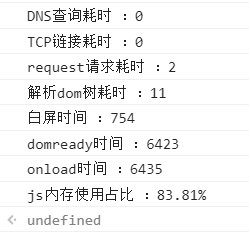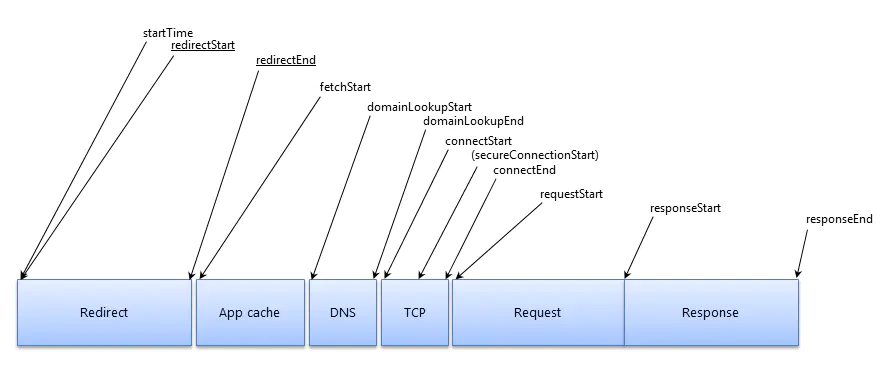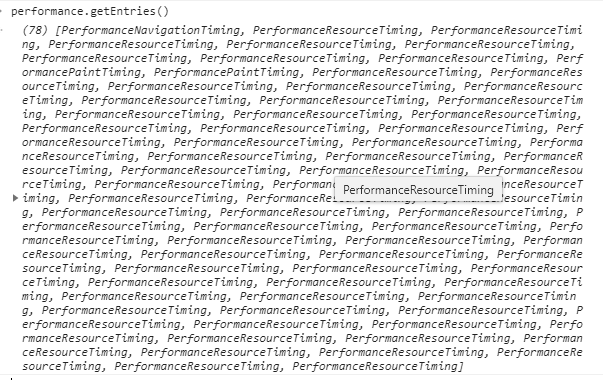标签:user 通过 loaded lan 全局 点击 时间戳 api request请求
最近,需要对业务上的一些性能做一些优化,比如降低首屏时间、减少核心按钮可操作时间等的一些操作;在这之前,需要建立的就是数据监控的准线,也就是说一开始的页面首屏数据是怎样的,优化之后的数据是怎样,需要有一个对比效果。此时,performance 这个API就非常合适了。
window.onload = function(){ setTimeout(function(){ let t = performance.timing console.log(‘DNS查询耗时 :‘ + (t.domainLookupEnd - t.domainLookupStart).toFixed(0)) console.log(‘TCP链接耗时 :‘ + (t.connectEnd - t.connectStart).toFixed(0)) console.log(‘request请求耗时 :‘ + (t.responseEnd - t.responseStart).toFixed(0)) console.log(‘解析dom树耗时 :‘ + (t.domComplete - t.domInteractive).toFixed(0)) console.log(‘白屏时间 :‘ + (t.responseStart - t.navigationStart).toFixed(0)) console.log(‘domready时间 :‘ + (t.domContentLoadedEventEnd - t.navigationStart).toFixed(0)) console.log(‘onload时间 :‘ + (t.loadEventEnd - t.navigationStart).toFixed(0)) if(t = performance.memory){ console.log(‘js内存使用占比 :‘ + (t.usedJSHeapSize / t.totalJSHeapSize * 100).toFixed(2) + ‘%‘) } }) }

performance对象是全局的,它的timing属性是一个对象,它包含了各种与浏览器性能有关的时间数据,提供浏览器处理网页各个阶段的耗时。

performance.timing对象包含下列属性(全部只读):
navigationStart:当前浏览器窗口的前一个网页关闭,发生unload事件时的Unix毫秒时间戳。如果没有前一个网页,则等于fetchStart属性。
unloadEventStart:如果前一个网页与当前网页属于同一个域名,则返回前一个网页的unload事件发生时的Unix毫秒时间戳。如果没有前一个网页,或者之前的网页跳转不是在同一个域名内,则返回值为0。
unloadEventEnd:如果前一个网页与当前网页属于同一个域名,则返回前一个网页unload事件的回调函数结束时的Unix毫秒时间戳。如果没有前一个网页,或者之前的网页跳转不是在同一个域名内,则返回值为0。
redirectStart:返回第一个HTTP跳转开始时的Unix毫秒时间戳。如果没有跳转,或者不是同一个域名内部的跳转,则返回值为0。
redirectEnd:返回最后一个HTTP跳转结束时(即跳转回应的最后一个字节接受完成时)的Unix毫秒时间戳。如果没有跳转,或者不是同一个域名内部的跳转,则返回值为0。
fetchStart:返回浏览器准备使用HTTP请求读取文档时的Unix毫秒时间戳。该事件在网页查询本地缓存之前发生。
domainLookupStart:返回域名查询开始时的Unix毫秒时间戳。如果使用持久连接,或者信息是从本地缓存获取的,则返回值等同于fetchStart属性的值。
domainLookupEnd:返回域名查询结束时的Unix毫秒时间戳。如果使用持久连接,或者信息是从本地缓存获取的,则返回值等同于fetchStart属性的值。
connectStart:返回HTTP请求开始向服务器发送时的Unix毫秒时间戳。如果使用持久连接(persistent connection),则返回值等同于fetchStart属性的值。
connectEnd:返回浏览器与服务器之间的连接建立时的Unix毫秒时间戳。如果建立的是持久连接,则返回值等同于fetchStart属性的值。连接建立指的是所有握手和认证过程全部结束。
secureConnectionStart:返回浏览器与服务器开始安全链接的握手时的Unix毫秒时间戳。如果当前网页不要求安全连接,则返回0。
requestStart:返回浏览器向服务器发出HTTP请求时(或开始读取本地缓存时)的Unix毫秒时间戳。
responseStart:返回浏览器从服务器收到(或从本地缓存读取)第一个字节时的Unix毫秒时间戳。
responseEnd:返回浏览器从服务器收到(或从本地缓存读取)最后一个字节时(如果在此之前HTTP连接已经关闭,则返回关闭时)的Unix毫秒时间戳。
domLoading:返回当前网页DOM结构开始解析时(即Document.readyState属性变为“loading”、相应的readystatechange事件触发时)的Unix毫秒时间戳。
domInteractive:返回当前网页DOM结构结束解析、开始加载内嵌资源时(即Document.readyState属性变为“interactive”、相应的readystatechange事件触发时)的Unix毫秒时间戳。
domContentLoadedEventStart:返回当前网页DOMContentLoaded事件发生时(即DOM结构解析完毕、所有脚本开始运行时)的Unix毫秒时间戳。
domContentLoadedEventEnd:返回当前网页所有需要执行的脚本执行完成时的Unix毫秒时间戳。
domComplete:返回当前网页DOM结构生成时(即Document.readyState属性变为“complete”,以及相应的readystatechange事件发生时)的Unix毫秒时间戳。
loadEventStart:返回当前网页load事件的回调函数开始时的Unix毫秒时间戳。如果该事件还没有发生,返回0。
loadEventEnd:返回当前网页load事件的回调函数运行结束时的Unix毫秒时间戳。如果该事件还没有发生,返回0。
performance.now()方法返回当前网页自从performance.timing.navigationStart到当前时间之间的毫秒数。
performance.now() // Date.now() 近似等于 (performance.timing.navigationStart + performance.now())
该方法是做一个标记mark,结合measures方法,可以计算两个标记之间间隔的时间差;因此可以直接依据业务上的不同,计算两个业务逻辑之间的距离。
// 以一个标志开始。 performance.mark(‘mySetTimeout-start‘); // 等待一些时间。 setTimeout(function() { // 标志时间的结束。 performance.mark(‘mySetTimeout-end‘); // 测量两个不同的标志。 performance.measure( ‘mySetTimeout‘, ‘mySetTimeout-start‘, ‘mySetTimeout-end‘ ); // 获取所有的测量输出。 // 在这个例子中只有一个。 var measures = performance.getEntriesByName(‘mySetTimeout‘); var measure = measures[0]; console.log(‘setTimeout milliseconds:‘, measure.duration) // 清除存储的标志位 performance.clearMarks(); performance.clearMeasures(); }, 1000);
浏览器获取网页时,会对网页中每一个对象(脚本文件、样式表、图片文件等等)发出一个HTTP请求。performance.getEntries方法以数组形式,返回这些请求的时间统计信息,有多少个请求,返回数组就会有多少个成员。
由于该方法与浏览器处理网页的过程相关,所以只能在浏览器中使用。

(1)performance.navigation.type: 该属性返回一个整数值,表示网页的加载来源
0:网页通过点击链接、地址栏输入、表单提交、脚本操作等方式加载,相当于常数performance.navigation.TYPE_NAVIGATENEXT。
1:网页通过“重新加载”按钮或者location.reload()方法加载,相当于常数performance.navigation.TYPE_RELOAD。
2:网页通过“前进”或“后退”按钮加载,相当于常数performance.navigation.TYPE_BACK_FORWARD。
255:任何其他来源的加载,相当于常数performance.navigation.TYPE_UNDEFINED。
(2)performance.navigation.redirectCount: 该属性表示当前网页经过了多少次重定向跳转。
参考:https://developer.mozilla.org/zh-CN/docs/Web/API/Performance
标签:user 通过 loaded lan 全局 点击 时间戳 api request请求
原文地址:https://www.cnblogs.com/vickylinj/p/14232358.html